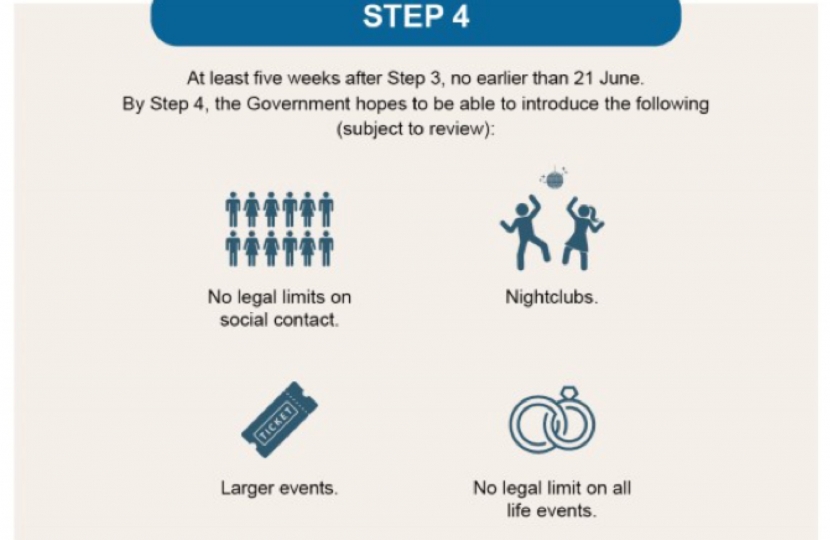
Today, as we proceed to the final step of our roadmap out of lockdown – replacing legal restrictions with personal judgment, the Prime Minister has urged people to exercise caution and continue to come forward for both jabs.
Thanks to the success of our historic vaccination programme and the continued efforts of the British people, we have severely weakened the link between cases and hospitalisations – saving thousands of lives and protecting the NHS. That is why we are now able to move to the next step of our lockdown roadmap, ending limits on social gatherings and the 1-metre plus rule, allowing weddings, concerts and events to take place without restrictions, and – subject to local regulations – no longer mandating face coverings to be worn.
Whilst we enjoy our restored freedoms, we must remember that the pandemic is not over and cases will continue to rise over the coming weeks. So as we all learn to live with this virus, we must continue to carefully manage the risks from COVID and exercise judgement when going about our lives.
More than 10 million people now using the NHS App

New figures released today show over 10.4 million people have now downloaded the NHS App, with over 6 million new users since the vaccination status service was added in May, and we have now launched the COVID Pass to provide another tool in our fight against the virus.
The success of our world-beating vaccination programme means over two thirds of adults in the UK are now fully protected from the virus, meaning we can now look towards measures that allow people to get on with their lives and reopen the economy. That is why the Government has launched the NHS COVID Pass, providing proof of vaccination that streamlines international travel, attending largescale events, and returning to the workplace – and provides another tool to keep us safe in our fight against the virus.
In addition, double vaccinated frontline NHS and social care staff in England who have been told to self-isolate will now be permitted to attend work after having a negative PCR test and taking a negative lateral flow test for up to 10 days, alleviating pressure on NHS and social care services.
With over 30 countries and thousands of UK businesses recognising the COVID pass, the British people will enjoy even greater freedom to get on with their lives, whilst supporting our venues and businesses to reopen safely.
The increase in app downloads also has potentially life-saving benefits as over 90,500 people have registered their organ donation preference via the app during May and June. Registering a preference helps NHS specialist nurses to quickly understand what people want to happen to their organs and enables them to discuss their wishes directly with their family.
Users are also benefiting from easier access to NHS Services. During May and June over 1,248,800 repeat prescriptions were ordered and over 103,900 GP appointments booked via the app, saving patients and clinician’s valuable time.
For more information on the NHS App and the new NHS COVID Pass verification, including comments from the Health and Social Care Secretary, please visit: https://www.gov.uk/government/news/more-than-10-million-people-now-using-the-nhs-app.
All UK adults offered first dose of coronavirus vaccine

All adults in the UK have now been offered a first dose of the COVID-19 vaccine, hitting our target ahead of schedule.
In February, the Government pledged that all adults would be offered a vaccine by the end of July, and that two in three adults would be double vaccinated by 19 July.
Through the world leading success of our vaccine programme, we have exceeded those targets – now that every adult has been offered a vaccine, 88% of adults have received a first dose, and 68% have received two doses.
The success of our vaccine programme has severely weakened the link between cases, hospitalisation, and deaths, allowing us to cautiously ease restrictions today.
New research into treatment and diagnosis of long COVID

Yesterday the Government announced new research into diagnosing and treating long COVID, to better understand the condition and identify new treatments.
Research shows that while the majority of people make a full recovery from COVID-19 some people experience longer lasting symptoms. That is why the Government is building on our £100 million in care funding and £50 million in research funding for long COVID. Through the National Institute for Health Research (NIHR), the Government has commissioned 15 new studies, backed by £19.6 million, to improve diagnosis of the condition, care services, and symptom management, and identify effective treatments.
The projects will focus on:
- better understanding the condition and identifying it
- evaluating the effectiveness of different care services
- better integrating specialist, hospital and community services for those suffering with long COVID
- identifying effective treatments, such as drugs, rehabilitation and recovery, to treat people suffering from chronic symptoms
- improving home monitoring and self-management of symptoms, including looking at the impact of diet
- identifying and understanding the effect of particular symptoms of long COVID, such as breathlessness, reduced ability to exercise and ‘brain fog’
Commissioning this research will be life changing for those who are struggling with longer-term symptoms, as we configure our treatment and care to best treat long COVID.
For more information on the Government’s new research into treatment and diagnosis of long COVID, including comments from Health and Social Care Secretary and the Chair of NIHR’s long COVID funding committee and Medical Director of the NIHR Clinical Research Network, please visit: https://www.gov.uk/government/news/new-research-into-treatment-and-diagnosis-of-long-covid.
Biggest flu programme in history to roll out for winter 2021

The Government has announced the biggest seasonal flu programme in British history that will vaccinate 35 million people from September, alongside any booster programme for COVID-19 vaccines as part of wider autumn and winter planning - which centres around protecting as many lives as possible.
As a result of COVID-19 restrictions that were in place, flu levels were significantly lower than expected last winter, increasing the likelihood of higher flu levels this year. That is why the Government are building on last years expanded flu vaccine programme, under which four in five people 65 and over in England received a jab.
For the first time all school pupils up to Year 11 will be offered a jab, along with all children aged two and three from the end of August, clinical risk groups including pregnant women, the over 50s, unpaid carers, frontline health and social care staff, and close contact of immunocompromised people.
Eligible groups are urged to get their free vaccine every year and to protect themselves and the most vulnerable people in society ahead of the winter.
For more information on the biggest flu programme in history to roll out for winter 2021, including the Health and Social Care Secretary and the Medical Director at Public Health England, please visit: https://www.gov.uk/government/news/biggest-flu-programme-in-history-to-roll-out-for-winter-2021.
